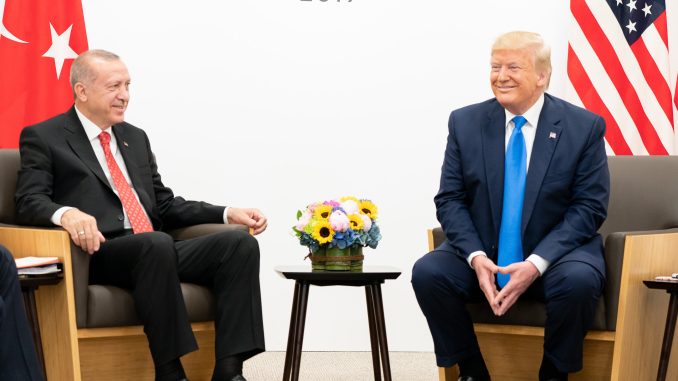Peloni: Trump’s Turkey policy will be seen to be pivotal to the stability of the region, particularly if he is successful in dealing with Iran’s nuclear program. He should not be securing this rogue nation with the means to further expand its borders at the expense of its neighbors, and allowing him to return to the F35 program will do exactly this.
Sinan Ciddi & Jonathan Schanzer | Apr 23, 2025
 (Photo by The White House from Washington, DC – President Trump at the G20, Public Domain)
(Photo by The White House from Washington, DC – President Trump at the G20, Public Domain)
Turkish Foreign Minister Hakan Fidan recently declared Ankara would purchase an estimated $20 billion in American spare parts, ammunition, and electronics for its military. Turkey wants more than just spare parts. It wants to be re-admitted to the small club of countries that can purchase the advanced F-35 jet fighter. Turkey was booted from the program in 2019 for purchasing the Russian-made S-400 air defense system, defying explicit warnings from the Trump administration.
Turkey never relinquished the system, so Washington should deny this request.
The Trump administration slapped sanctions on Turkey in 2020. Trump wielded the Countering America’s Adversaries Through Sanctions Act (CAATSA), which penalizes foreign governments that make significant defense purchases from Russia. Turkey’s acquisition of the Russian-made S-400 system was a clear-cut case.
There are only 20 countries in the F-35 club right now. America and 19 close allies benefit from the world’s most advanced jet fighter. The partners include Australia, South Korea, the United Kingdom, Israel, Italy, the Netherlands, Denmark, and Norway. Admission to this club is perhaps the ultimate sign of trust between Washington and its best partners.
Turkey is a NATO ally, but it does not deserve to be included in this exclusive club. The problems go far beyond Turkey’s acquisition of the S-400. And Hakan Fidan, the man currently wooing Washington, is at the center of those problems.
Before becoming foreign minister, Fidan headed Turkey’s intelligence agency (MIT) from 2010 to 2023. During that time, Fidan steered Turkey away from its Western alliances, aligning it instead with Islamist regimes and extremist movements.
Fidan was central to making Turkey a safe haven for Hamas. Beginning in 2011, he enabled the group to operate on Turkish soil—raising funds, recruiting, and coordinating attacks against Israel. Hamas reportedly received a Turkish pledge of $300 million in 2011, and today maintains offices in Ankara and Istanbul with access to Turkish leadership, including President Recep Tayyip Erdogan. On October 7, as Hamas carried out its slaughter of 1,200 Israeli civilians, Hamas leader Ismail Haniyeh reportedly celebrated from Turkey.
Fidan’s record extends beyond Hamas. Turkey became a strong advocate of the Muslim Brotherhood, allowing the Islamist movement to establish institutional presence in Turkey. Ankara championed the Muslim Brotherhood government under Mohamed Morsi in Egypt before its downfall in 2014.
But nowhere was Ankara’s support for Islamists more visible than in Syria. In the early years of the Syrian civil war, Fidan and Erdogan labored to overthrow Bashar al-Assad and install a Sunni regime aligned with Ankara. Fidan supported jihadist factions with ties to Al-Qaeda, and eventually ISIS. By 2014, Turkey relaxed border controls, enabling ISIS fighters to cross into Syria. Under Fidan’s direction, Turkey facilitated ISIS’ financing operations—including black-market oil and illicit antiquities sales.
Since the fall of the Assad regime in December 2024, Fidan has proudly touted Ankara’s role in enabling the military offensive that brought Hayat Tahrir al-Sham (HTS)—a U.S.-designated Al-Qaeda affiliate—to power. HTS now rules Syria with Turkish backing.
Turkey also threatens America’s regional allies. The Turkish navy continues to violate the exclusive economic zones of Greece and Cyprus. Greece is a NATO ally. Cyprus is a member of the European Union. One can only imagine the threats they might face if confronted by Turkish F-35s in the future.
Then there is the democracy deficit in Turkey. The country’s institutions have been eviscerated by Erdogan, who has held power for more than two decades. He has gutted the media, the judiciary, the military, and other institutions that were once pillars of Turkey’s proud if imperfect liberal order.
In short, Turkey has a long rap sheet. But that’s not why it was kicked out of the F-35 program in 2019. In the end, the reasons were technical. The system poses a significant kinetic threat to American and allied aircraft, including the F-35. It also poses a cyber threat to NATO systems if they are integrated.
Fidan recently met Secretary of State Marco Rubio in Washington. One never knows what happens behind closed doors in these meetings. The readout of the meeting was carefully crafted and conveyed the sense that Rubio was friendly but firm on some American concerns. If Rubio played his cards right, he was a lot tougher on Fidan than the readout described.
Only pressure on Turkey will push it to become the ally that America expects it to be. Until then, Fidan should not get another meeting with America’s top diplomat, and Turkey should be left out in the cold.
Sinan Ciddi is a non-resident senior fellow at the Foundation for Defense of Democracies, a Washington based think tank (FDD). Jonathan Schanzer is executive director of FDD.



They can sell them.
Just like the ones they sell to the other Muslin countries. They work fine, until the US flips the switch (via satelite) and then they become as harmful as a Cessna 172.